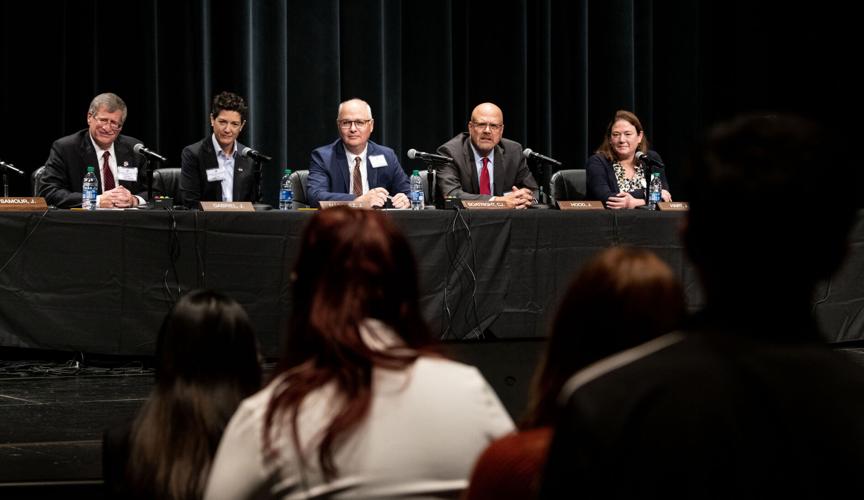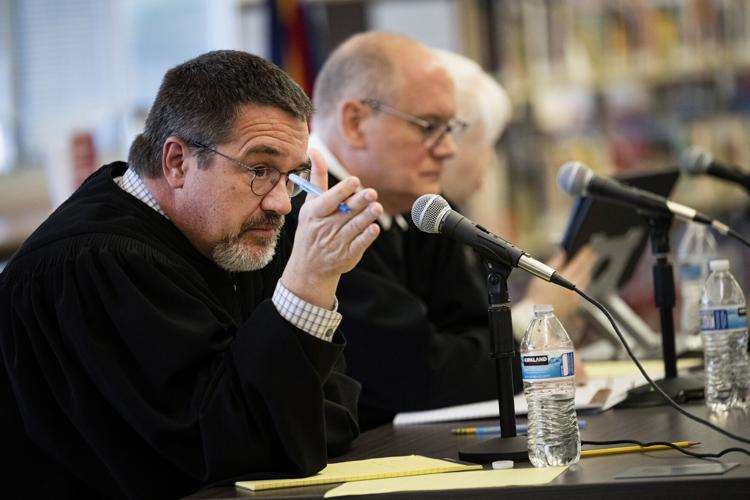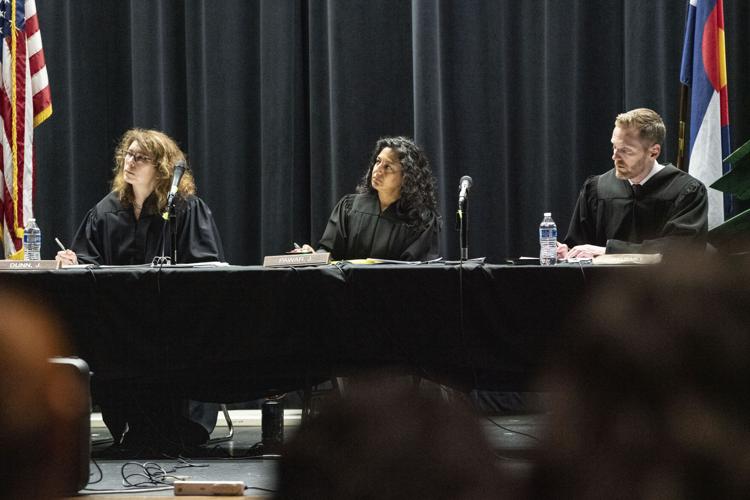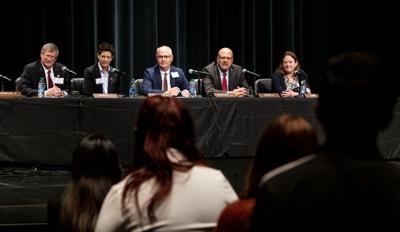The Colorado Supreme Court announced on Monday it will hear three cases to rein in the confusion that has developed in the wake of its landmark 2021 decision addressing the process for making criminal defendants pay financial restitution to their victims.
The questions the justices will answer include:
• Can a defendant's plea agreement relinquish any challenge to a timely restitution order?
• Must restitution orders always get overturned when judges do not comply with the law?
• Should appellate courts even review the defendant's challenge to a restitution order when there is a request to hold a hearing outside the 91-day window?
In Colorado, when a convicted defendant is required to pay restitution, prosecutors typically must provide the requested amount by the time of sentencing or within 91 days of sentencing. Judges must also impose the restitution amount within 91 days of sentencing. If judges need to extend either deadline, they must find good cause exists.
In a major decision, People v. Weeks, the Supreme Court ruled in November 2021 that judges' typical process of awarding compensation to crime victims did not comply with state law. The justices noted a lackadaisical approach had taken hold in the trial courts that neglected the clear deadlines and procedural requirements. Consequently, if trial judges fail to follow the law, they lose authority to issue a restitution order.

Colorado Supreme Court Justices Carlos A. Samour Jr. and Richard L. Gabriel listen to Assistant Deputy Jefferson County Attorney Rebecca P. Klymkowsky during oral arguments in the County of Jefferson v. Beverly Stickle case during Courts in the Community on Thursday, Oct. 26, 2023, at Gateway High School in Aurora, Colo. (Timothy Hurst/Denver Gazette)
However, in the three years since Weeks, the state's Court of Appeals has turned into ground zero for fights over whether and when an untimely restitution order needs to be vacated. Lawyers and judges have expressed frustration with how to apply the restitution law, with prosecutors generally pushing for flexibility and defense lawyers demanding an exact application of the Supreme Court's directive.
The Court of Appeals will "continue vacating otherwise valid restitution orders using similar theater-of-the-absurd reasoning that has flourished since this Court announced Weeks," Assistant Solicitor General Brittany Limes Zehner recently wrote to the Supreme Court.
"The current flood of litigation over these issues will largely be avoided," shot back Judge Timothy J. Schutz in a February appellate opinion, "if the prosecution fulfills its obligation to use diligent efforts to gather and present the information necessary to resolve restitution at the sentencing hearing, coupled with (trial judges') establishment of case management practices that ensure such obligations are fulfilled."
The three Court of Appeals decisions the Supreme Court agreed to hear were all handed down in a short span last year. Although Court of Appeals opinions are not binding on the court itself, each set a precedent for trial judges to follow. Problematically, the three-judge panels that decided each case reached different, potentially contradictory conclusions.

Colorado Court of Appeals Judges Stephanie Dunn, Neeti V. Pawar and Grant T. Sullivan listen to the case of Strange v. GA HC Reit Liberty CRCC, LCC at Fort Lupton High School on Tuesday, April 2, 2024 in Fort Lupton, Colorado. The Colorado Court of Appeals and Supreme Court hold "Courts in the Community" events for students to learn about the justice system and hear real cases. (Rebecca Slezak For The Denver Gazette)
In the first decision, issued in May 2023, Darryl Cornelius Johnson pleaded guilty in El Paso County to stealing from his employer, Walmart. His plea agreement noted the prosecution would "act in good faith" to provide restitution details within 91 days of sentencing. On the 91st day, prosecutors proposed restitution of $11,030 and the trial judge signed off on the order.
Weeks later, Johnson objected and requested a hearing. In total, accounting for the restitution hearing, the trial judge entered the final decision 287 days after sentencing.
The Court of Appeals panel, 2-1, decided the order was valid. In an unusual move, each judge wrote separately to lay out their reasoning.
Judge Rebecca R. Freyre, writing for the majority, believed the standing orders in the case, which gave the defense time to object to restitution, provided "good cause" to extend the 91-day deadline. Judge Craig R. Welling, in a concurrence, added that the provision in Johnson's plea agreement giving the prosecution 91 days to come up with an amount made the proceedings timely.
Then-Judge David Furman disagreed on both fronts. He believed, first, the prosecution had the restitution amount at the time of sentencing and failed to disclose it. Second, the standing order giving time to object was not the same thing as good cause, and "seems typical of how courts handled restitution before Weeks."
Both Johnson and the prosecution sought the Supreme Court's review. Johnson argued the panel's majority violated Weeks and undermined what the Supreme Court said about good cause. The Colorado Attorney General's Office countered a delay that happens at the request of the defendant is no reason to overturn a restitution order.
The case is Johnson v. People.

Colorado Court of Appeals Judge David Furman asks a question during oral arguments in the second of two Colorado Court of Appeals cases being held in the library of Conifer Senior High School as part of the Courts in the Community educational outreach program on Tuesday, May 16, 2023, in Conifer, Colo. (Timothy Hurst/Denver Gazette)
One month after the Court of Appeals decided Johnson's case, a different panel upheld Zachary Eugene Babcock's $12,259 restitution order in Adams County. There, prosecutors provided their restitution request 80 days after sentencing. The defense objected on the 90th day and asked for a hearing outside the 91-day window. The trial judge's final order came 239 days after sentencing.
Babcock's appellate panel evaluated whether trial judges can still issue a valid restitution order when a defendant requests a hearing outside the deadline, but the judge neglects to find good cause. Yes, they can, the panel decided.
By knowingly giving up his right to a decision within the 91-day deadline, "we conclude that Babcock waived his challenge to the timeliness of the restitution order, and we therefore do not address the merits of that challenge," wrote Judge Ted C. Tow III.

Colorado Court of Appeals Judge Ted C. Tow III asks a question to Assistant Attorney General Jaycey DeHoyos, not pictured, during oral arguments in the second of two Colorado Court of Appeals cases being held in the library of Conifer Senior High School as part of the Courts in the Community educational outreach program on Tuesday, May 16, 2023, in Conifer, Colo. (Timothy Hurst/Denver Gazette)
Babcock appealed to the Supreme Court, arguing he should not have had to choose between a timely restitution order and his right to challenge the prosecution's proposed amount.
"Such a dilemma cannot be considered voluntary," wrote public defender Jessica A. Pitts.
The case is Babcock v. People.
Finally, in July 2023, a third appellate panel overturned the $62,241 restitution order for Jessica Jo Roberson in Weld County. In Roberson's case, the prosecution provided its request well within the deadline and the defense objected with ample time left on the clock. However, after a series of revised requests and further objections, the trial judge wound up extending the proceedings beyond the 91-day deadline without mentioning good cause, and issued her final order 446 days after sentencing.
The appellate panel acknowledged the decisions from the prior two months, but opted to go a different direction. It disagreed with the panel from Johnson's case, believing a defendant's objection did not automatically supply good cause to go beyond the 91-day deadline. As for Babcock's case, that logic did not apply because Roberson never asked for a hearing outside of the deadline.
"True, defense counsel accepted a new status conference date that was more than ninety-one days after sentencing," wrote Judge Jaclyn Casey Brown, "but no language in the restitution statute suggests that doing so automatically extends the deadline by which the court must determine restitution or waives a defendant’s right to challenge the timeliness of the restitution order."
This time, the prosecution turned to the Supreme Court to ask it to reverse the panel's decision and, more broadly, bring stability to the competing schools of thought emanating from the Court of Appeals.
"It’s time for this Court to step in and resolve these lingering post-Weeks issues that continue to vex trial courts," wrote Limes Zehner.
The case is People v. Roberson.







(0) comments
Welcome to the discussion.
Log In
Post a comment as Guest
Keep it Clean. Please avoid obscene, vulgar, lewd, racist or sexually-oriented language.
PLEASE TURN OFF YOUR CAPS LOCK.
Don't Threaten. Threats of harming another person will not be tolerated.
Be Truthful. Don't knowingly lie about anyone or anything.
Be Nice. No racism, sexism or any sort of -ism that is degrading to another person.
Be Proactive. Use the 'Report' link on each comment to let us know of abusive posts.
Share with Us. We'd love to hear eyewitness accounts, the history behind an article.